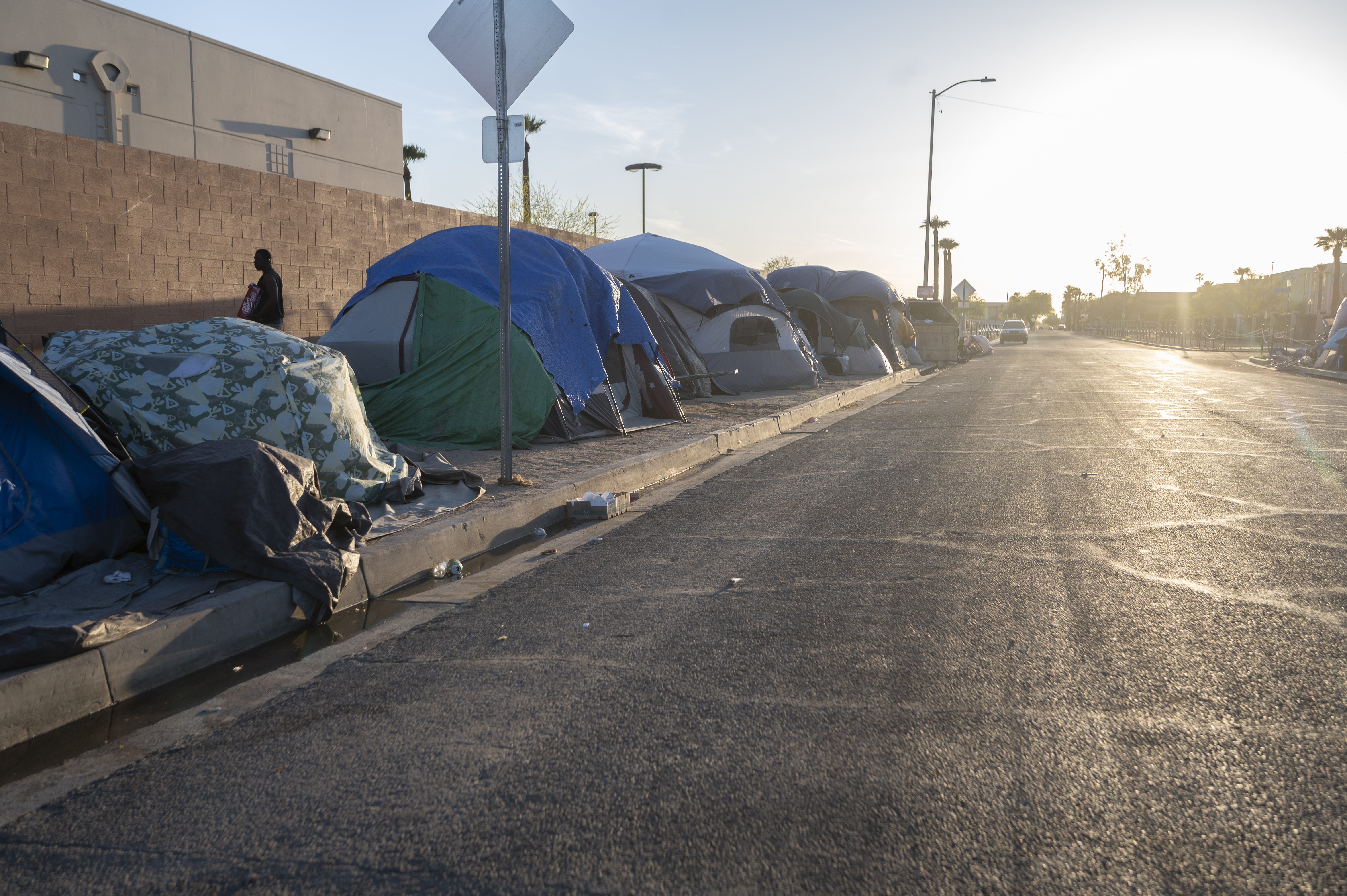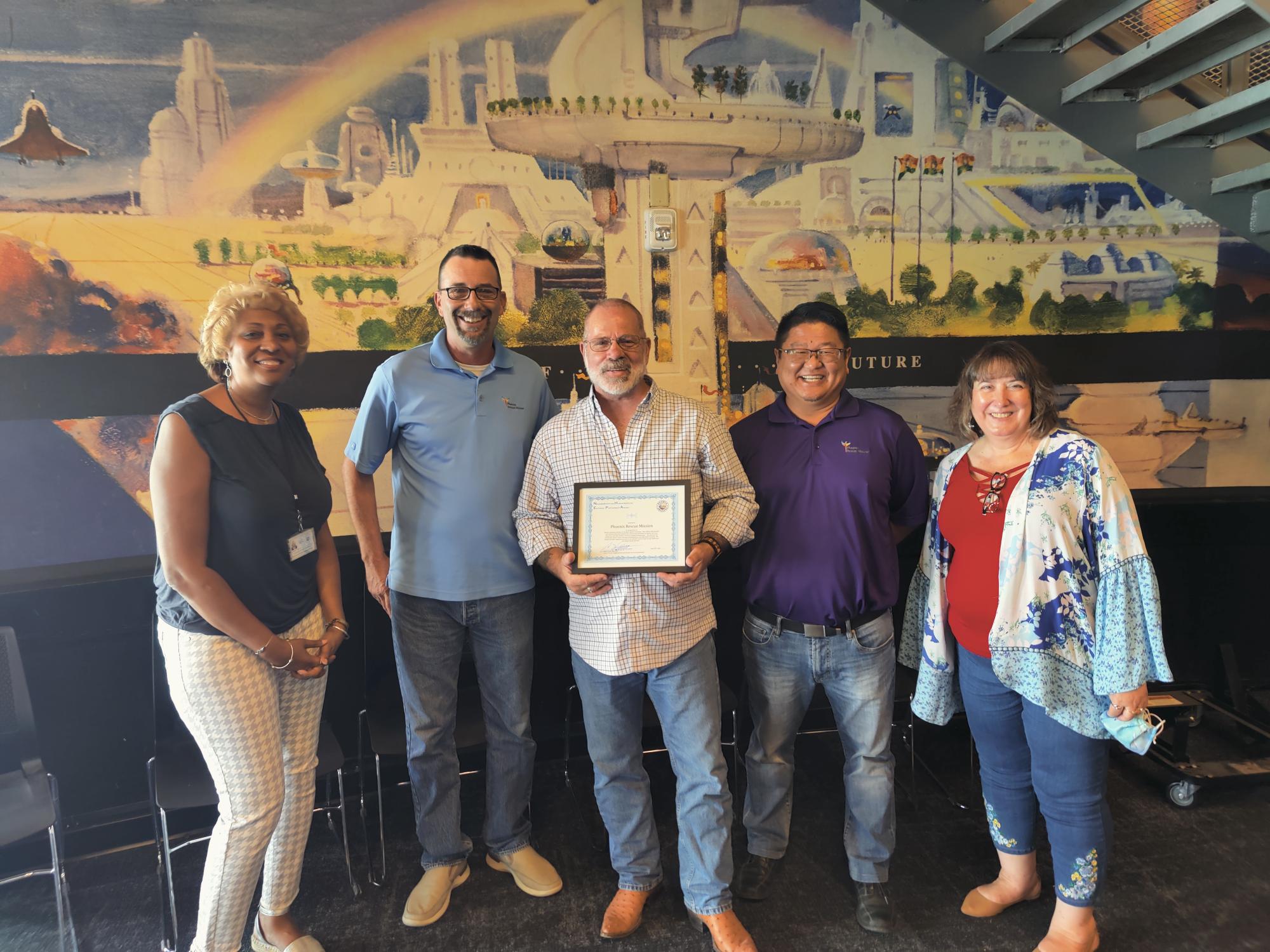Journalism
in action

Photo courtesy of Phoenix Rescue Mission
Housing and recovery services exist in Phoenix, but need collaboration to meet their potential
Reframe your mindset with this two-episode podcast series about members of the homeless community, those who are trying to help, and the connections they’re making.
Greta Forslund
One morning in mid-April, Don Bishop watched three police officers walk into the Peoria Community Center with a warrant for the arrest of a teen boy who was homeless and trying to stay clean. After an exchange with the officers and a few hours, the boy left the community center with a promise the police would drop his warrant if he stayed in the Transforming Life Center (TLC) at the Phoenix Rescue Mission.
Bishop is a case manager assistant at the Phoenix Rescue Mission, a Christian mission serving people facing homelessness, hunger, addiction and trauma. There, he connects with people in need of the mission’s services and is recognized in the community as someone to turn to for help.
He and the teen met before, in January. Bishop took him to the TLC then, too, but the boy only stayed for two days before leaving. When they met again in April, the teen said he had been looking for Bishop. He’d stayed clean for a while, but was still making the wrong decisions, and ended up in a situation where he couldn’t say no, Bishop said.
“Of course, he had all the guilt going on and everything, and so I had to let him know to just take the rearview mirrors and toss them out. Don’t look behind you,” Bishop said.
Bishop, just over 60, spends a lot of time visiting places like the Peoria Community Center for outreach efforts. When the officers were searching for the boy at the community center, they recognized Bishop with him.
“I almost cried. Because I told him, ‘Look, do you understand that God just gave you a Get Out of Jail Free card?’” Bishop said. “It was amazing. Because that’s what it takes. Sometimes it’s just keeping working with people.”
To Bishop, success stories like these are an example of the power of faith in true healing from things like addiction and serious mental illness — both of which are common in the people he serves through the mission.
But full recovery from complex issues requires more than just that. Services like housing assistance, meal and detox programs alone don’t fix the internal sources of struggle Bishop described. Likewise, faith and ministry alone don’t fix the systemic barriers between people in need of housing and permanent, sustainable housing solutions, he said.
Combined with secular programs, faith-based resources for people experiencing homelessness are all over the Valley. They focus on meeting a wide range of needs, including dining services, emergency shelter and health rehabilitation. But without connections and shared resources, Bishop said, these services don’t do all the good they could if churches, cities and organizations collaborated.
In Phoenix, homelessness has been on the rise for years. The point-in-time unsheltered street count is an annual census of people living unsheltered in Maricopa County. In the January 2022 count, there were almost 3,100 people counted in Phoenix — an increase of over 50% since the 2019 count.
The city has been trying to find housing solutions through state legislation and local efforts. For example, the city of Phoenix has been gradually increasing its shelter beds, and some state lawmakers have introduced legislation that aimed to increase housing supply and affordability. But Phoenix faces roadblocks like zoning restrictions, pushback from homeowners and limited resources allocated by state and local governments to make these things happen.
In the absence of government-provided resources, it’s the job of faith-based organizations to fill in where they can, Bishop said.

Phoenix Rescue Mission case manager assistant Don Bishop with the Great Partners Award given to the mission by the city of Peoria for the mission’s work in June 2022. Courtesy of Phoenix Rescue Mission Facebook page.
Faith as a step toward recovery
Bishop’s own experience with addiction recovery and finding housing sparked his involvement in serving people experiencing homelessness and his commitment to Christianity. He’s been working at Phoenix Rescue Mission for a year.
When he was 56, Bishop attempted suicide. At the time, he was homeless, and he’d had alcoholism since he was 7 years old. He hasn’t drank or struggled with suicidal ideation since his attempt, he said.
Bishop said after a turbulent childhood and many years of addiction and depression leading up to his attempt, he was “56 years old going on 15.”
A year into what many would consider recovery, Bishop realized there was a difference between sobriety and recovery. For many people, recovery means participating in a 30, 60 or 90-day recovery program that helps them get sober, he said. But there’s still work left to do after that step.
“They’re still dealing with the stinking thinking,” Bishop said. “They still haven’t dealt with the problem because their drugs and or alcohol is not a problem. It’s the symptom of a bigger problem. So, it’s the bigger problem that needs to be addressed.”
The disconnect between recovery from addiction and recovery from trauma is a major barrier for many people seeking to recover from substance use and find stable housing. It’s why Bishop believes faith and spirituality are so pivotal in the true recovery process.
“Recovery is getting back something that was taken away from you. And so, for me, God gave back what the drugs and alcohol took away. And that was after he revealed to me that healing is something that happens from the inside out,” Bishop said. “Meaning that just because I changed what I do, that doesn’t necessarily change the way I think. But if I change the way I think it will automatically change the things that I do.”
Resources exist, but don’t work to their full potential
Across Arizona, organizations both secular and religious offer mental health care, addiction recovery, emergency housing, meals and other services to people in need. These help, Bishop said, but it’s easy to fall into the cracks between them when trying to access services.
Bishop said more secular outpatient resources like Alcoholics Anonymous and Celebrate Recovery are a good start for getting sober. There are enough of them out there that you could go to a different one every night of the week, he said.
It was hearing testimony at an AA group that first made Bishop realize he wasn’t alone when he started his recovery.
“I believe there’s more to the spiritual aspect of things, but nonetheless, lead the mind and the body follows on a more basic level. And that’s real important,” he said.
Bishop said places like Community Bridges, Inc., a health care agency with behavioral health and addiction treatment centers across Arizona, are good at what they do, but also leave a gap in the journey to a full recovery.
“Ask anybody on the street about CBI? ‘No thanks. Been there, tried that, doesn’t work,’” Bishop said. “If you look at the success rate, the success rate speaks for itself. When they don’t deal with that spiritual side of it, then it’s a revolving door.”
Inpatient services like Dream Center, which offers emergency shelter, counseling and spiritual resources, are more comprehensive, he said.
“When they deal with the spiritual side of it, is it a longer program? Yes. But also, the success rate is through the roof,” he said. “Not as many people will choose that, but the ones who do make it. They make it.”
There’s still a place for services like CBI in the path to secure housing and recovery from addiction or mental illness, Bishop said, it just shouldn’t be the only option. Tools like cognitive behavioral therapy and intensive outpatient sessions are a crucial foundation to recovery for many people, but to him, it’s the personal and spiritual resources that help heal people in lasting ways.
Elements like being exposed to other people in similar situations, hearing their testimonies and living in a space designed to support you for an extended period of time can change people’s behaviors and attitudes so they don’t end up back in the place they started, Bishop said.
“Take away the insecurity and fill it with identity and security, and that’s what helps,” Bishop said. “That’s what brings a person from sobriety to recovery is that very thing right there.”
‘The church needs to wake up’
Bishop is working to make his vision a reality in his daily outreach, and by sharing his ideas with other community leaders and figures with resources to help make change if they collaborate. He’s speaking for a group of leadership figures from Christ-centered organizations like Teen Challenge and Dream Center in May about what needs to change.
“I don’t want to sound like nobody does it right,” Bishop said. But too many people are prideful in the help they offer. He said outreach ministries say, “We don’t need the church, the church isn’t a building, the church is the people.”
They’re right and they’re wrong, he said.
““The whole village comes out to do the harvest. The farmer might plant the fields, but it takes the whole village to do the harvest, and that’s the problem — they don’t come together,” Bishop said.
Gone are the days of churches going to parks to offer prayers, meals and blankets to people and invite them to stay at a shelter and leave when they don’t accept, he said. The process needs to be more comprehensive in bringing people step by step to recovery and housing.
“If the detox center was in communication with the next step, they could get them into the next step. Instead of saying, ‘Good luck with your sobriety, see you next time,’ it’s like, ‘Hey, I never want to see you again.’ And then send them to the next step. And then when you’re done there, send them to the next step,” Bishop said. “It’s called discipleship. And that’s the way it was supposed to be in the first place. That’s how the church was supposed to work.”
It’s not just faith-based organizations that need to come together to create lasting change. Bishop wants to see metro Phoenix cities pool resources to afford emergency shelters to house more people in need and hire clinicians needed to address serious mental illness.
“When we come in and we stick with it and we help them through each step of that discipleship process, of that recovery process, and we actually walk with them, then we’re going to reap the benefits. There’s no other way to do it,” Bishop said.
“You can even … take the spirit out of it if you want to, take the Bible out of it. I wouldn’t. But if you want to, you can. It’s still the same concept — we’ve gotta see them from beginning to end.”
